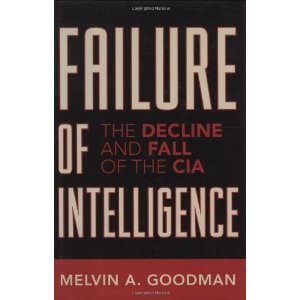
Mel Goodman
5.0 out of 5 stars Tough Love for CIA, March 6, 2008<
Retired Reader (New Mexico) – See all my reviews
This is an astonishingly well balanced book that while deeply critical of CIA and its senior management also credits its strengths and successes. The author, Melvin Goodman, spent some 34 years as an analyst within the Directorate of Intelligence (DI) of CIA. His principal criticism is that CIA directors in collusion with the executive branch have routinely politicized not merely intelligence products, but the very processes of research and analysis basic to intelligence production. He further argues that most intelligence `failures' can be traced to the practice of far too many at CIA to distort the intelligence process to support policy decisions and even to suppress sound, contrary intelligence. He also sees the growing `militarization' of the U.S. Intelligence System as further evidence that the Intelligence Community (IC) is moving from producing objective and accurate intelligence to producing intelligence that supports the ideologies and prejudices of its masters.
Goodman supports his argument with a remarkably detailed chronicle of CIA intelligence production over the last 35 years. This chronology emphasizes those instances where political pressure and the need to support a particular point of view took precedence over the need to produce accurate intelligence. Also, although he doesn't say so directly, he demonstrates the truth that intelligence is only as good as the system it serves. Unlike so many books on intelligence, this book actually identifies both the good guys and the bad .guys of CIA over the years. In particular he has a fascinating analysis of CIA Directors from Bill Casey (1980-1986) onward that is quite devastating. Although his principal target is the deleterious effect of the politicization and militarization of intelligence, he also effectively criticizes CIA's analytic and clandestine tradecraft.
This is an absolutely important critique of the course of CIA and by extension the entire U.S. Intelligence Community. However, given the controversial claims made by Goodman and the fact he actually names his heroes and villains, the reader might ask does he really know what he is talking about? In this reviewer's opinion, the answer is yes he does. Having been personally involved in a number of specific intelligence events that he chronicles, this reviewer would argue that Goodman has accurately described them. This is a book that ought to guide any effort to reform the U.S. Intelligence System.




